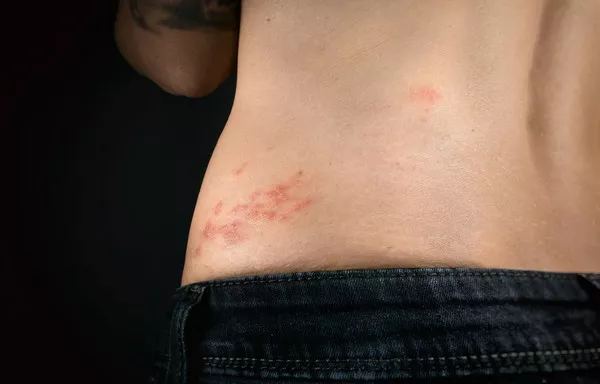Shingles is a painful skin condition that affects many people. It is caused by a virus, and while it is most common in older adults, anyone who has had chickenpox can develop shingles. In this article, we will explore the causes of shingles, how it develops, risk factors, symptoms, and treatment options.
Understanding the Virus Behind Shingles
Shingles is caused by the varicella-zoster virus (VZV), which is the same virus that causes chickenpox. After a person has chickenpox, the virus remains dormant in the body, hiding in the nerve cells. It can reactivate years later, leading to shingles. The virus typically reactivates when the immune system is weakened or compromised, allowing the virus to travel along nerve pathways to the skin, where it causes the characteristic rash and pain of shingles.
How Does the Virus Reactivate?
The varicella-zoster virus can remain inactive in the body for many years after a person has had chickenpox. The immune system usually keeps the virus in check, preventing it from reactivating. However, if the immune system becomes weakened, the virus may become active again. This reactivation results in shingles. The immune system can weaken due to several factors, which we will discuss in detail later.
Risk Factors for Developing Shingles
While shingles can affect anyone who has had chickenpox, certain factors increase the risk of developing the condition. Some of these factors include:
Age: The risk of shingles increases with age. People over the age of 50 are more likely to develop shingles. As people age, their immune system becomes less efficient, making it easier for the virus to reactivate.
Weakened Immune System: People with weakened immune systems are more likely to develop shingles. Conditions like HIV/AIDS, cancer, or autoimmune diseases, as well as certain medications like immunosuppressants or chemotherapy, can compromise the immune system and increase the risk of shingles.
Stress: Emotional or physical stress can affect the immune system, increasing the likelihood of shingles. Chronic stress can lower the body’s ability to fight infections, leading to reactivation of the virus.
Previous Chickenpox Infection: Anyone who has had chickenpox is at risk for shingles. The virus remains in the body even after the symptoms of chickenpox have resolved, and it can reactivate years later, often in a weakened immune state.
Family History: A family history of shingles or chickenpox may increase your chances of developing the condition. Genetics can play a role in how the body responds to viral infections, including VZV.
Gender: Women are more likely to develop shingles than men. Some studies suggest that hormonal differences between men and women might play a role in the increased risk.
Symptoms of Shingles
The main symptom of shingles is a painful rash that usually appears on one side of the body. This rash typically develops in a band-like pattern along a nerve. Before the rash appears, many people experience a tingling, burning, or itching sensation on the skin. Other common symptoms include:
- Pain, burning, or itching in a specific area of the skin
- Red, blistering rash that usually appears in a strip-like pattern
- Fever and chills
- Headache
- Fatigue
- Sensitivity to light
The rash may be painful and last for several weeks, and the pain can continue even after the rash heals, a condition known as postherpetic neuralgia. This type of pain can be severe and long-lasting.
Why Does the Virus Reactivate?
The varicella-zoster virus reactivates when the immune system is weakened. There are several reasons why this might happen:
Aging: As people age, their immune systems naturally weaken. This can make it harder for the body to keep the varicella-zoster virus dormant. Older adults, especially those over the age of 50, are more likely to experience shingles because of this weakened immune response.
Illness: When a person becomes ill, especially with a disease that weakens the immune system, the varicella-zoster virus can become active. For example, diseases like HIV/AIDS or cancer, or treatments like chemotherapy, can compromise the immune system and make shingles more likely.
Stress: Stress, whether physical or emotional, can weaken the immune system. People who are under chronic stress are more likely to experience shingles because the virus is able to reactivate during times of emotional or physical strain.
Medications: Certain medications that suppress the immune system can increase the risk of shingles. Medications like corticosteroids, used to treat conditions like asthma or arthritis, and chemotherapy drugs used to treat cancer can make it easier for the varicella-zoster virus to reactivate.
Trauma or Injury: Injury or trauma to the skin, particularly in areas where the varicella-zoster virus lies dormant in the nerve cells, can trigger the reactivation of the virus. This is why shingles often appears in specific areas of the body, following the path of nerves.
Other Conditions: Conditions such as diabetes, autoimmune diseases, or any disorder that weakens the immune system can contribute to the reactivation of the varicella-zoster virus.
Complications of Shingles
While shingles is usually not life-threatening, it can cause significant discomfort and complications. Some of the most common complications include:
Postherpetic Neuralgia (PHN): This is the most common complication of shingles, occurring when the pain continues after the rash has healed. PHN can be severe and last for months or even years. The pain can be burning, stabbing, or throbbing and may be difficult to treat.
Eye Problems: If the shingles rash affects the eye area, it can lead to a condition called herpes zoster ophthalmicus. This can cause eye pain, vision problems, and even permanent vision loss if not treated promptly.
Bacterial Infections: The blisters caused by shingles can become infected with bacteria. This can lead to cellulitis, an infection of the skin, or other more serious bacterial infections.
Hearing Problems: In rare cases, shingles can affect the ear and lead to hearing problems or balance issues. This is known as Ramsay Hunt syndrome.
Neurological Complications: In rare cases, shingles can lead to more serious neurological complications, such as encephalitis (inflammation of the brain) or meningitis (inflammation of the membranes around the brain and spinal cord).
Treatment for Shingles
While there is no cure for shingles, treatment can help reduce symptoms and speed up recovery. The main treatment for shingles includes:
Antiviral Medications: These medications, such as acyclovir, valacyclovir, and famciclovir, can help reduce the severity and duration of the rash and pain. They work best if started within 72 hours of the appearance of the rash.
Pain Relievers: Over-the-counter pain relievers like acetaminophen or ibuprofen can help manage pain. For more severe pain, doctors may prescribe stronger pain medications, such as opioids or nerve pain medications like gabapentin.
Topical Treatments: Calamine lotion or other soothing creams can help reduce itching and discomfort. Cool compresses may also be helpful in relieving pain.
Steroids: In some cases, corticosteroids may be prescribed to reduce inflammation and pain, especially if the rash affects the eye area.
Vaccination: The shingles vaccine, such as Shingrix, is recommended for people over the age of 50 to reduce the risk of developing shingles and its complications. It can also help reduce the severity of the disease in people who do get shingles.
Prevention of Shingles
The best way to prevent shingles is by getting vaccinated. The shingles vaccine is highly effective at reducing the risk of shingles and its complications. Even if you have already had shingles, the vaccine can help reduce the risk of future outbreaks. It is recommended that adults over the age of 50 receive the vaccine, even if they have had chickenpox in the past.
Conclusion
Shingles is caused by the reactivation of the varicella-zoster virus, which remains dormant in the body after a person has had chickenpox. The virus can reactivate when the immune system is weakened due to factors such as aging, stress, illness, or medications. Shingles can cause painful rashes and other complications, but antiviral medications and pain relievers can help manage symptoms. The best way to prevent shingles is by getting vaccinated, especially for people over the age of 50. If you suspect you have shingles, it is important to see a healthcare provider promptly for treatment to reduce the risk of complications.
Related topics



























